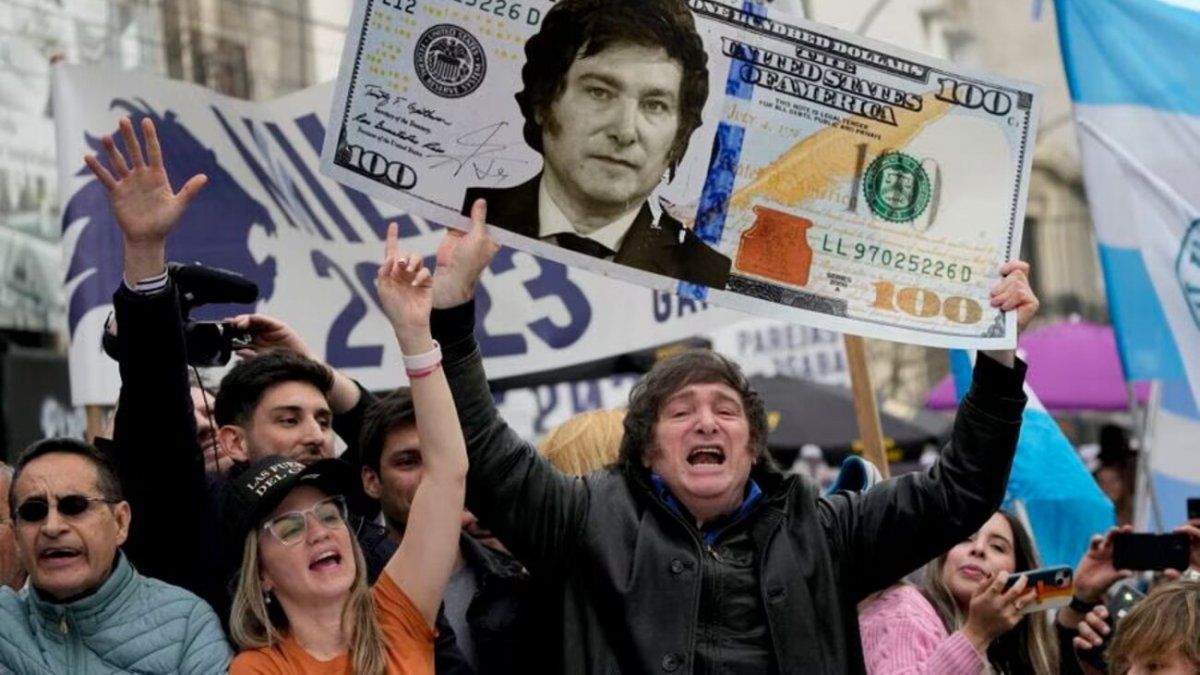President Javier Milei is preparing a package of announcements and measures for the first business day that he will have to govern: December 11. The novelty is that the fiscal shock will be the only immediate management that can compromise. A State reform law will be sent to Congress. Eleven ministries will be eliminated.
The rest of the electoral promises will have to wait for later. Put in clear language, fiscal adjustment should replace the rest of the reforms that cannot yet be addressed. There will be no dollarization (although the promise is maintained). There will be no exchange rate unification, nor disarmament of the stocks. There will also be no cut in inflation and a tax cut is not likely. Strictly speaking, as the leader of La Libertad Avanza anticipated, the opposite could take place: a realignment of the dollar, an update in rates (cut in subsidies), fuels and even a jump in the price of other goods and services. Inflation at cruising speed. The Milei shock aims to achieve financial balance (primary result + debt interest) of public accounts.
Maybe that’s why, in the last few hours, Milei decided to revive with more force the idea that it will privatize public companies or companies with state participation. That narrative arc could help him reinforce the patience of his electorate, eager to see a tangible impact that helps in the delicate reality of pockets. Perhaps anticipating potential rearrangements and ignoring current agreements, food companies registered increases that are between 20 and 30% compared to recent weeks.
This forecast coincides Enrique Cristofani, former president of Santander bank and advisor to Patricia Bullrich. In the last few hours, his name emerged to occupy a key position. Cristofani thinks that, to order the economy, we must first order the fiscal. It points out that the deficit is financed with taxes, and that the tax burden exceeds that of neighboring countries by 7 points of GDP. In his opinion, this brings more debt and default through, the credit is closed. Finally, he says, the deficit is covered by emission, which brings inflation.
Leliq and discreet jump
There is more. Former official Luis “Toto” Caputo – who is still discussing the possibility of joining a possible Ministry of Economy and even participated in a zoom with the IMF – is in charge of exploring the chance of raising some US$15,000 million to finance the disarmament of the Leliq. They are almost 3 times the monetary base. In Milei’s opinion, resolving the Leliq question is a necessary – but not sufficient – condition to unify dollar quotes, undo the exchange rate trap and avoid an inflationary stampede. Along these lines, it is worth thinking: if there is no possibility of dismantling the stocks, but Minister Massa has already given the signal that he will maintain the crawling peg (there is an export dollar for a few days), What possibilities can there be for a jump in the official dollar starting December 10 that aims to mitigate the exchange rate delay but without the expectation of unification?
Contacts with the Fund: Kaplan’s visit
Another important fact is that contacts with the International Monetary Fund began. On the one hand, last Thursday, at Jorge Argüello’s farewell at the Argentine embassy in Washington, Michael Kaplan was present, speaking through. Kaplan is Assistant Secretary for the Western Hemisphere at the US Department of the Treasury., and one of the totally indispensable voices if we want to “recalibrate” the goals of the program with the IMF. Kaplan had good concepts with Argentina, and those who were there say that it was a sign of support in the previous one. This information reached the ears of the candidate to occupy the Chief of Staff of the next Milei government. We talk about Nicolás Posse, who in the last few hours has already contacted the Fund and it seems, will be one of those in charge of the relationship with the multilateral organization. A review of Argentine accounts was scheduled for November and US$900 million must be paid in December.
There also remains, for now, the question about Mercosur. In the meeting that took place yesterday between President Alberto Fernández and the elected president Javier Milei, Fernández warned him that on December 7 he will be in Brazil, with the purpose of attending a Mercosur meeting.. Obviously, the host of that meeting will be Lula da Silva. Although the incumbent president told Milei of the importance of maintaining the relationship with Brazil, for now there are no signs of a rearrangement in the bilateral conversation between Milei and Lula.
They are looking for US$ 15,000 million and a minister
The search for a Minister of Economy continues. It was already talked about Luis “Toto” Caputo, who would have said no, but anyway participated in the zoom with the IMF. Although the list of candidates sounds Federico Sturzenegger, Luciano Laspina (endorsed by Macri), and even the former director of the Central, Demian Reidelit seems that there are other references from the economic world who remain expectant: Emilio Ocampo would be in charge of the Central Bank, Guillermo Nielsen will arrive in Argentina in a few days and Horacio Liendo works on a proposal.
dollar and after
The expectation for a rearrangement of quotes pushed financial dollars in recent hours. Last night, journalist Lautaro Maislin asked President Javier Milei about the blue dollar, which previously exceeded $1,000. “Is it expensive or cheap?” he asked. Lautaro. “To say that a price is expensive or cheap is fatally arrogant,” Milei responded. “An economist believes in the market, the market price is always the correct price,” he added. On the other hand, the strong increases in the Buenos Aires stock market and in New York with Argentine assets leave some message. “The market decided to pay for the oil and gas and public services industries, which today tend to be sensitive to the delay in prices and regulated rates,” they noted in Delphos. They maintain that, one step behind, there were defensive roles that had already rewarded banks prior to the elections (TXAR and ALUA), “which should be the most sensitive to the macro adjustments expected in the next one or two years.” .
Source: Ambito




